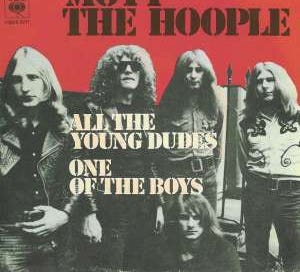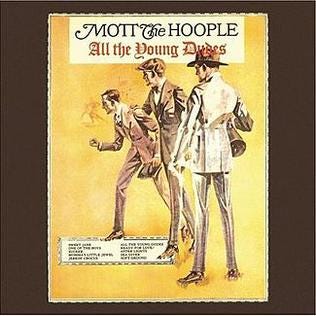“All the Young Dudes” by MOTT THE HOOPLE
The 50th anniversary of David Bowie's endeavor to save one of his favorite bands.
Oh, brother, you've guessed, I'm a dude
David Bowie first offered “Suffragette City,” which he had already recorded for the yet-to-be-released Ziggy Stardust & The Spiders from Mars album. Bowie had learned of Mott the Hoople’s impending breakup from bassist Pete Overend Watts, who had rung him up looking for a job, and resolved to save the band. Watts played Bowie’s demo of “Suffragette City” for the band’s singer, Ian Hunter, who liked the song but rejected it on the basis of “it was a good tune and it rocked, but we already had good tunes that rocked.” Hunter had a point, as the song wouldn’t sound out of place on their previous album, Brain Capers, which Bowie admired, but had failed to sell. To finally break through after years of relentless touring, Hunter knew the band needed a career-making hit, one with the potential to be a classic.
Bowie came back with a song he said he wrote for them, one better suited for Hunter’s croaky voice, in two hours. (Mick Ronson later told Hunter that Bowie had previously cut a demo for the song but put it aside because he wasn’t happy with it. Anyway – print the legend.) They met at the offices of manager Tony Defries1, where Bowie played “All The Young Dudes” on acoustic guitar. When he was through, Bowie inquired, “I thought that might do the trick?”
“All The Young Dudes” was recorded in a single six-hour session produced by Bowie and Ronson in May of 1972; it was the first time Mott the Hoople2 had played the song. Up to that point, Mott had approached the studio like a live gig — show up and knock it out. Since the band hadn’t rehearsed it, Bowie played the song in the studio, and they played it back to him. (That’s Bowie’s guide vocal mixed into the choruses.) Bowie and Ronson, particularly, had learned a lot by looking over Man Who Sold the World producer Tony Visconti’s3 shoulder and sweated details to get the sound. Bowie pulled the band, along with his bodyguard Stuey George, into the studio’s stone stairwell to record the handclaps that gird the choral choruses.
On All The Young Dudes, the song starts with Mick Ralph’s faintly sinister guitar solo slicing its way through the tape slur left by the abrupt ending of the album’s previous song, “Momma’s Little Jewel.” (It sounds like someone kicked the tape machine’s cord out of the wall in the middle of Andy Mackay4’s sax solo.) As Ralph bends the last note of the solo upward, his guitar is pushed louder in the mix, fading just in time for Hunter’s vocal to come honking in. It’s like a theatrical fanfare introducing the star of the show and is just one of the touches that gives Mott a cleaner, more commercial sound while not dampening the swagger that made them a great live band — louche but never loose.
A lot of that swagger is owed to Hunter, who makes himself the star of the show. While his 3 am vocal tone could range from gritty howl to a Canada goose, he’s one of the great singers in Rock ‘n’ Roll, adeptly cribbing from everything the genre is made from — Elvis, R&B, country, etc. Through the verses, he grounds the song’s lyrics about suicide and a group of outsiders who sound fresh from an audition for a London production of a Lou Reed5 song with a conversational, barstool tone. He just sounds cool. So much of the Rock era prayed at the altar of cool, but so few songs capture what it’s like to authentically be that way. This one does.
Now I've drunk a lot of wine and I'm feeling fine
Got to race some cat to bed
Oh, is there concrete all around or is it in my head?
Yeah, I'm a dude, dad
Hunter’s voice jumps in the bridges, however, climbing the ascending melody as if he’s aching to he heard, and it’s here where “All The Young Dudes” earns its mark as the Glam Rock anthem. The song doesn’t have the punched-up Rock sound of T. Rex or Slade; nor does it pose the artistic challenges of the intellectual wing of the party, Bowie and Roxy Music. What it does in straddling the fault line between the ‘60s and ‘70s is stake a new generation’s claim on the culture. Let your older brother stay “at home with his Beatles and his Stones”; it’s not his world anymore. It belongs to the dudes, who even in a world where hope wilted with the flower children, could at least be cool.
Even so, Bowie was tiring of “All The Young Dudes” in the studio and indicated that Mott’s “One Of The Boys” would be a better single. The “All The Young Dudes” chorus, the thing about the song that on first hearing gave Hunter the feeling that his life would be changed forever, was wearing on Bowie. So Hunter improvised, telling Bowie and Ronson to roll tape for him to cut another vocal line. He got behind the mic as if he was onstage, bantering with the audience, speaking to the dudes. Toward the end, he recalled a recent London show where he bade the crowd to push a heckler to the front so that he could pour a beer on the lad’s head. “Now you, all his friends… Now you bring him down, 'cause I want him… Bring him, here you go! I've wanted to do this for years!” he laughs between lines in chorus. Hunter refashioned a “Hey Jude”-style hippie singalong into a cheeky call and response. That got Bowie’s attention and saved Mott the Hoople’s career-making classic.
“All The Young Dudes” peaked at #3 in the UK (at that point the highest chart position for a David Bowie composition) and went top-40 in the US. Queen opened for Mott The Hoople on the UK tour (the only time they were the opening act), and while Hunter insisted that his band wouldn’t open for anyone on their home turf, not even David Bowie to whom they owed much, they opened the US leg of the Ziggy Stardust and the Spiders from Mars tour through the end of 1972. Bowie called Mott The Hoople on stage for encores to sing the anthem they created together.
Ian Hunter kept a diary through the tour, writing, “It may look flashy, but it’s over and you are finished before you know it — if you aren’t already broken by one thing it will be another.” Hunter later published his account of the tour, titling the book Diary of a Rock ‘n’ Roll Star.
17 Song Playlist
If you like The New York Dolls, please go directly to “Death May Be Your Santa Claus.”
Rock ‘n’ Roll Sweepstakes: The Authorized Biography of Ian Hunter
Campbell Devine’s book is a fun read, particularly for Hunter’s extended quotes. One of the things Devine posits is that Bowie’s attraction to Mott was that he saw them as the original punks, and The Clash’s Mick Jones is quoted as saying “If there was no Mott there would be no us.”
You can read it on Scribd for free with a 30 Day trial here. (Disclosure: My wife works for Scribd over in the fiction side of things.)
Thank You
Substack sends an email whenever there’s a new subscriber for this newsletter, and each one is inspiring. Thank you for joining us.
Defries would soon take on management of Mott the Hoople on the strength of the song, but mainly to please Bowie.
The band’s name comes from a Willard Manus novel about an eccentric who works at a circus freak show., which is more poignant by the time of “The Ballad of Mott The Hoople,” and it’s chorus of “the rock ‘n’ roll circus is in town.”
Visconti’s Bowie credits of course are more extensive than just Man Who Sold the World — that’s just the one of his early Bowie productions where Ronson was in the band. For fun, check out Visconti’s production credits sometime. He’s not exactly an unsung hero, but his CV is eye-popping. I’ve been listening to T Rex lately and have been struck by just how amazing those records sound.
I met Visconti once in his New York studio, by the way. He was very nice; he brought me coffee, which I took black because I couldn’t bring myself to ask for milk or sugar. I still take it black to this day.
Andy Mackay of Roxy Music fame.
Mott the Hoople covered Reed’s “Sweet Jane” on All The Young Dudes at Bowie’s suggestion. Bowie brought Reed in to sing a guide vocal, but while Hunter respected Reed (“minimalism… is the hardest thing to do,” Hunter later said) they… didn’t get along.






Awesome detailed story & of course your links to the songs-thank you!